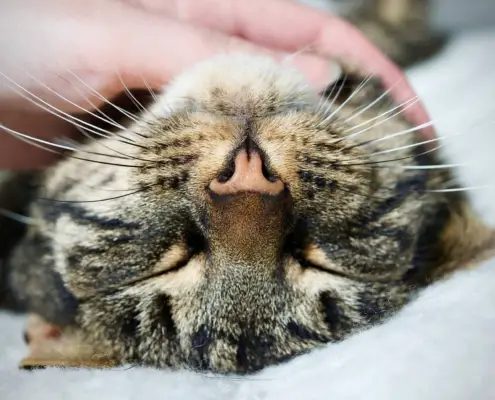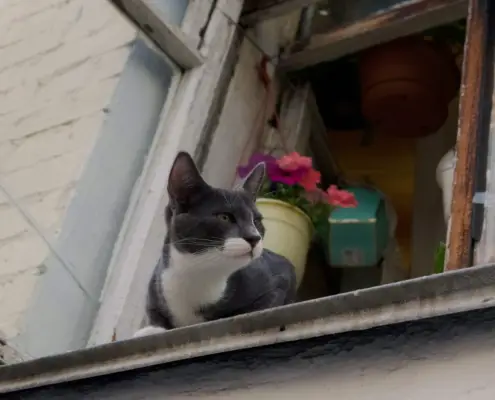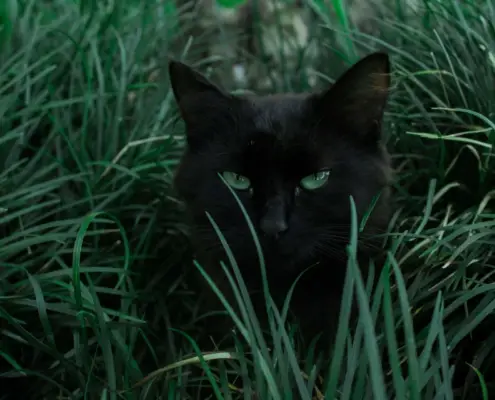
Cats have long been known for their mysterious and independent nature. One of the most fascinating aspects of their behavior is their preference for nighttime activities. Many cat owners have experienced the frustration of their furry friends becoming hyperactive and playful just as they are ready to settle down for the night. But why do cats want to play at night? In this article, we will delve into the world of feline behavior and explore the reasons behind this nocturnal instinct.
Understanding the natural instincts of cats
To understand why cats want to play at night, it is important to first look at their evolutionary history. Cats are natural predators, and their ancestors were primarily nocturnal hunters. This means that their bodies and instincts are wired to be most active during the nighttime hours. While domestication has certainly changed some aspects of their behavior, these deep-rooted instincts still remain.
The science behind cats’ preference for nighttime play
The preference for nighttime play in cats can be attributed to their unique physiology. Cats have highly developed senses, including excellent night vision and acute hearing. These adaptations allow them to navigate and hunt in low-light conditions efficiently. Additionally, cats have a higher concentration of rod cells in their eyes, which are responsible for detecting motion. This enables them to spot potential prey more easily during the night.
Research has also shown that the hormone melatonin, which regulates sleep and wakefulness, plays a role in cats’ nocturnal behavior. Melatonin levels in cats tend to be higher during the night, making them naturally more alert and active during those hours.
Factors that contribute to cats’ nighttime activity
While cats’ natural instincts are a significant factor in their preference for nighttime play, there are other factors that contribute to this behavior. One such factor is the lack of daytime stimulation. Cats are crepuscular animals, meaning they are most active during dawn and dusk. However, many indoor cats do not have access to the same level of stimulation during these hours, as their human companions are often away at work. As a result, they may accumulate energy throughout the day and release it during the night.
Another contributing factor is the influence of their human companions. Cats are highly adaptable creatures and can adjust their activity patterns to align with their owners’ schedules. If a cat’s human companion is more active during the evening, the cat may naturally gravitate towards nighttime play to seek attention and interaction.
The role of hunting and prey drive in cats’ nighttime behavior
Cats are born hunters, and their instinct to chase and capture prey is deeply ingrained. For an indoor cat, their human companions often become the substitute prey. When a cat engages in nighttime play, they are essentially mimicking the hunting behavior they would exhibit in the wild. Pouncing, stalking, and chasing toys or laser pointers provide cats with mental and physical stimulation while satisfying their innate predatory instincts.
Ways to channel your cat’s nocturnal energy
While it may not be possible to completely change a cat’s natural inclination for nighttime play, there are several strategies that can help channel their energy in a more desirable direction. One effective method is to establish a regular playtime routine during the evening hours. Engaging your cat in interactive play sessions using toys that mimic prey can help fulfill their hunting instincts and tire them out before bedtime.
Providing mental stimulation is equally important. Puzzle toys or treat-dispensing toys can keep your cat engaged and mentally stimulated during the day, reducing their need for nighttime play. Additionally, creating a stimulating environment with scratching posts, climbing trees, and hiding spots can encourage your cat to explore and play during the day, expending energy in a more balanced manner.
Creating a sleep-friendly environment for your cat
While it may be tempting to try and keep your cat awake during the day to prevent nighttime play, this can be counterproductive. Cats need their rest, and sleep deprivation can lead to behavioral problems and health issues. Instead, focus on creating a sleep-friendly environment for your cat. Ensure that they have a comfortable and quiet sleeping area away from any disturbances, such as loud noises or bright lights. Providing a cozy bed or blanket and keeping a consistent sleep routine can help signal to your cat that it is time to rest.
Tips for managing your cat’s nighttime play
If your cat’s nighttime play becomes disruptive or interferes with your sleep, there are several strategies you can employ to manage their behavior. One option is to provide a separate play area in another part of the house, away from your bedroom. This can help redirect their energy and minimize any disturbances during the night.
Another approach is to gradually shift your cat’s playtime to earlier in the evening. By engaging them in interactive play and providing mental stimulation during the twilight hours, you can help tire them out before bedtime. Additionally, incorporating calming activities such as gentle brushing or massage can help relax your cat and promote a more peaceful sleep.
Common misconceptions about cats’ nighttime behavior
There are several misconceptions surrounding cats’ nighttime behavior that are important to address. One common belief is that cats are intentionally trying to keep their owners awake. However, it is essential to remember that cats do not have the same understanding of sleep and wakefulness as humans. Their nighttime play is driven by their natural instincts and not by a desire to disrupt their owners’ sleep.
It is also important to note that not all cats have the same level of nocturnal activity. Some cats may naturally be more inclined to nighttime play, while others may exhibit a more balanced activity pattern throughout the day. It is crucial to understand and respect your cat’s individual needs and preferences when managing their behavior.
Embracing your cat’s natural instincts
While it may be challenging to adjust to a cat’s preference for nighttime play, it is essential to embrace and accommodate their natural instincts. Understanding the reasons behind their behavior can help foster a deeper connection with your feline companion. By providing them with appropriate outlets for their energy, creating a sleep-friendly environment, and managing their nighttime play, you can ensure a harmonious living arrangement for both you and your cat.
So the next time you find yourself being woken up by your cat’s playful antics in the dead of the night, remember that it is simply their way of expressing their innate instincts. Embrace their nocturnal nature and find joy in witnessing the wild spirit that lies within your domesticated feline friend.
If you enjoyed my article, I would appreciate you sharing it with your network.

Sima Ndlebe
Sima writes for CatBuzz. He is interested in Cats, Health and Fitness, and Entrepreneurship.
Published: 30 October 2023



